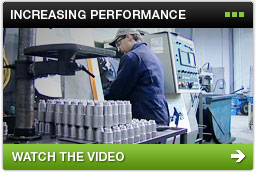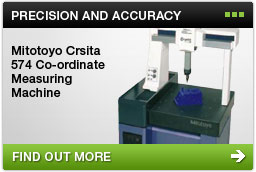Explosive Work
A multi-tasking machine was only way to go for job shop’s tight tolerance work on military training devices, including suicide bombs
When George Barnes opened his machine job Foldens Machine Works, in 2001 in Tillsonburg, ON, little did he know that he would soon be helping to save American and Canadian soldiers’ lives.
Barnes, a 30-year veteran machinist manufactures military training devices—e.g. suicide bombs—used mostly by Canadian and American soldiers, but also used by soldiers in other parts of the world such as Estonia and Turkey. The military training products he makes include Improvised Explosive Device simulators (IEDs) and parts for suicide vests. The training devices help soldiers evade or diffuse situations they encounter in places like Iraq and Afghanistan.
The military training device business makes up only about 20 per cent of his business, but Barnes plans to increase that percentage and has purchased new equipment to accommodate this—a second multi-tasking machining centre from Doosan Infracore, the Puma MX 2500, purchased through Doosan’s Eastern Canada distributor, Ferro Technique, Mississauga, ON. (Moore Industrial Ltd., Winnipeg, MB, is the distributor for Doosan Infracore in Central Canada, while Paine Machine Tool Inc., Delta, BC, is the sales point in BC.)
Other key markets Foldens serves are the industrial lift products area, which represents about 45 per cent of his business, agricultural equipment, 15 per cent and heavy truck, 20 per cent.
Barnes was so impressed with the Puma multi-tasking lathe he purchased last June for the tight tolerance military work, that he ordered a second Puma MX 2500. "We’re happy with the Doosan machines and they’re comparable to some of the other higher end machine tools. We’ll definitely be purchasing more Doosan machines in the future."
Barnes says that the Doosan multi-tasking machines were "a step up" for his operation. While happy with three Fadal CNC mills with fourth and fifth axis, three Hyundai CNC lathes (purchased through SMS Machine Tool, Etobicoke, ON, between 2001 and 2004), he needed higher end machine tools that could accommodate the tight tolerances required for his military parts work.
He’s impressed with the Doosan machine tools, but he admits that part of his decision was a result of following the salesperson, John McGonigle, who moved from SMS to Ferro Technique.
"I’ve had an 18-year relationship with John and I respect him and believe in long-term relationships when it comes to suppliers. I do that with my tooling as well," says Barnes.
Initially, Barnes says he wanted a twin turret, twin spindle lathe when he began his search for new machinery for his shop.
"But it wasn’t available soon enough so Ferro offered me this machine, a twin spindle, single turret lathe with milling capabilities. It turns out to be a much better choice for my shop."
An understated individual, Barnes becomes animated as he explains why a part he holds in his hands—a right-angle head, one of four heads for a suicide vest—is made on the multi-tasking machine.
"The new machine is a nine axis lathe with milling capabilities, so we can do complex parts. The machine is equipped with a 40-tool tool changer on the milling head and a 12-station turret on the lower turret for the turning tools. The milling head has the ability to turn, so we can have turning tools in the head, giving us more flexibility."
Tooling suppliers include Sandvik Coromant, Missisauga, ON, Sumitomo Canada Ltd, Toronto, ON, and Mitsubishi (MC Machinery Systems Canada, Richmond Hill, ON). The coolant supplier is Blaser Swisslube USA, supplied in Canada through Triumph Tool Ltd., Guelph, ON, (ELSO Ltd., Laval, QC).
The milling head rotates 60º either side of centre, allowing machinists to drill holes, mill or thread at angles. A feature that Barnes finds useful is the ability of the milling head to lock so that you can turn with it. "So a lot of our parts get turned simultaneously. We turn one side with the top milling head and turn the other side with the turret, all at the same time."
While there was a learning curve involved in going to a multi-tasking machine, it took Barnes about two days to figure out the machine and about a month for the operator who does the set-up, although the machine tool came with a three-week training package.
Barnes estimates that Foldens has reduced cycle part production time by 30 to 40 per cent.
One of the things that sets Foldens apart from other machine shops is its ability to design parts as well as machine them.
One of his key military customers, Mil-Sim-FX International, located in the business park just behind Folden’s shop, provides Barnes with an idea and he takes it from there. Barnes creates the design and a prototype using MasterCam X2 CAD/CAM software and creates the toolpath program right off of the drawing. His computer is connected to the machine tool, so the toolpath is sent to the computer.
"What I like about the machine is that it cuts down the number of set-ups and handling of parts. A blank goes in and a finished part comes out. We can do this robotically, but at this stage, we’re manually loading the parts into the machine," explains Barnes.
Part tolerances are maintained through the use of a Mitutoyo CMM, the Crysta 574 with X axis-500 mm, Y axis-700 mm and Z axis-400 mm.
While Foldens has several key markets it services, the company’s shop is versatile. The company can machine aluminium, brass, stainless steel, carbon, alloy steels and plastics. It buys its materials from several service centres, including Russel Metals, Aberfoyle, ON, Bothwell Steel, a division of Samuel & Son Co., Hespeler, ON, Earle M. Jorgensen, Mississauga, ON, and A.M. Castle, Mississauga, ON.
"We buy certain materials from each and we stay with those suppliers because we buy enough volume from each to fit the bracket for best pricing.
Foldens purchases approximately 300 to 400 tons of plate annually, about 20 tons of aluminium and about 85 to 90 tons of cold roll steel and alloys, estimates Barnes. Foldens also offers gas/plasma cutting. The Quike Aronson Mastergraph series 3100 model features six oxy-fuel torches with six in. cutting capacity and one hi-definition plasma head with 1/2 in. cutting capacity.
Barnes is a soft-spoken individual, but he is also a machinist that has garnered respect among manufacturers for doing quality work the first time. Indeed, one of the main reasons he started his business six and a half years ago was because customers asked him to.
"We’ve never looked for work, all of the work we do has come to us. Our largest customer, Linamar (Skyjack Division), came to us via a referral."
Two years ago, Foldens achieved ISO 9001:2000, part of Barnes’ ongoing plan to ensure his company is prepared to take on work that demands high quality standards.
And he’s set to expand. His new Puma MX 2500, which was slated to be installed in September, will be working in a larger machine shop. Barnes will be taking over two more bays in the building where Foldens is located and adding another 4800 sq ft to his current 9600 sq ft shop.
"We have 42 people in this shop, including six apprentices, three journeymen and the rest are operators or inspectors. We’re looking to grow to 70 people in the next five to six years and we’ll definitely be buying more Doosan machines."




